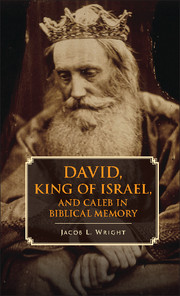Book contents
- Frontmatter
- Dedication
- Contents
- Preface
- 1 Slings and Arrows
- 2 Flesh and Stone
- 3 King of Judah
- 4 Tales of Loyalty and Betrayal
- 5 The Bones of Saul
- 6 Uriah the Hittite
- 7 Ittai the Gittite
- 8 David in Exile
- 9 Territorial Transitions
- 10 Chronicles
- 11 Caleb and the Conquest
- 12 Caleb the Warrior
- 13 Caleb the Judahite
- 14 War-Torn David
- Notes
- Index of Modern Authors
- Index of Biblical Passages and Related Texts
- Index of Historical Figures
2 - Flesh and Stone
From War Monuments to the David Story
Published online by Cambridge University Press: 05 June 2014
- Frontmatter
- Dedication
- Contents
- Preface
- 1 Slings and Arrows
- 2 Flesh and Stone
- 3 King of Judah
- 4 Tales of Loyalty and Betrayal
- 5 The Bones of Saul
- 6 Uriah the Hittite
- 7 Ittai the Gittite
- 8 David in Exile
- 9 Territorial Transitions
- 10 Chronicles
- 11 Caleb and the Conquest
- 12 Caleb the Warrior
- 13 Caleb the Judahite
- 14 War-Torn David
- Notes
- Index of Modern Authors
- Index of Biblical Passages and Related Texts
- Index of Historical Figures
Summary
Across the street from the State House on Boston’s Beacon Hill stands an imposing bronze relief sculpture. Although years of New England weather have dulled its glint, when the sun shines on it, the scene it depicts still comes to life. At the center rides a nineteenth-century military officer. He is surrounded by marching soldiers, young and old, with muskets resting on their shoulders. Above them hovers an angel of peace – a young woman in a flowing gown with her hand gesturing toward the horizon. The officer and his men advance under her aegis and direction. He is a white Union commander, and they are African American soldiers.
What is the purpose of this “symphony in bronze”? Why does it face the State House? Inscribed on the back of the monument, the words of Charles W. Eliot, Harvard’s twenty-first president, offer an explanation:
TOGETHER
THEY GAVE TO THE NATION AND THE WORLD UNDYING PROOF
THAT AMERICANS OF AFRICAN DESCENT POSSESS THE PRIDE,
COURAGE, AND DEVOTION OF THE PATRIOT SOLDIER.
ONE HUNDRED AND EIGHTY THOUSAND SUCH AMERICANS
ENLISTED UNDER THE UNION FLAG IN MDCCCLXIII – MDCCCLXV.
According to Eliot’s statement, the young soldiers stand for more than themselves. They represent an entire population: not only their many brothers who had fought in America’s Civil War, but also all “Americans of African descent.”
The monument portrays the Massachusetts 54th Volunteer Infantry. Formed in March 1863, this regiment consisted entirely of African American soldiers who, seizing on a clause in Lincoln’s Emancipation Proclamation, flocked from far and wide to take up arms for the Union. They ended up serving for a year and a half without pay.
- Type
- Chapter
- Information
- David, King of Israel, and Caleb in Biblical Memory , pp. 15 - 30Publisher: Cambridge University PressPrint publication year: 2014



